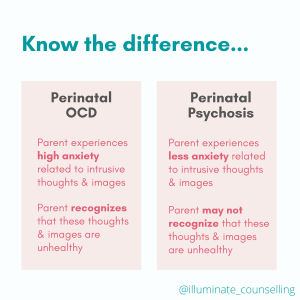Perinatal OCD vs. Perinatal Psychosis
Here we want to outline the key difference between Perinatal OCD and Psychosis, including the kinds of intrusive thoughts that would be considered lower risk, and the ones that require immediate medical attention. As counsellors, we cannot provide mental health diagnoses – this would be something that a medical doctor (GP, psychiatrist, etc.) or psychologist would determine through careful assessment. That said, there are marked features that can help you to self assess.

In Perinatal OCD, the parent tends to:
- experience high anxiety related to intrusive thoughts and images
- feel distressed initially by these thoughts and images, because they do not ‘fit’ with their self-concept, including their idea of who they are as a caretaker
- this is what we call ‘ego-dystonic’
In Perinatal Psychosis, the parent tends to:
- be less concerned or less anxious about the intrusive thoughts and images
- have little to no insight about the distorted nature of these thoughts
- be tempted to act on the thoughts because they feel reasonable according to their break from reality
- this is what we call ‘ego-syntonic’
- they may experience hallucinations related to harming the baby
How Common is Perinatal Psychosis?
Perinatal Psychosis is rare, but it is considered to be a medical emergency. Current stats suggest that the condition occurs after childbirth in approximately 0.1 – 0.2 % of births, although occasionally psychosis can begin during pregnancy or following pregnancy loss. Symptoms of postpartum psychosis most show up within the first 2 weeks after birth, so this is when a woman is at the greatest risk (PSI, 2020). This is likely in part due to the significant hormone changes that occur within a woman’s body during these times. Stopping breastfeeding or medication suddenly can also pose a risk as both of these will create rapid shifts in a woman’s brain biochemistry.
I’m Concerned about my Partner – What Questions Should I Ask?
If you are starting to question your loved one’s connection to reality, or are noticing any of the following signs, this may be cause for concern. Here are a few symptoms that may indicate possible perinatal psychosis and you will want to take further steps (PSI, 2020):
- Reports of seeing or hearing things that aren’t there
- High irritability
- Hyperactivity
- Severely depressed mood
- Suggestions that the baby is not theirs or belongs to someone else
- Not taking care of themselves or the baby’s basic needs
- Sudden mood changes
- Changes in speech such as rambling
- Paranoia or suspiciousness
- Any behaviour that seems abnormal for that woman
Of the individuals who develop a Perinatal Psychosis, research has suggested that there is approximately a 5% suicide rate and a 4% infanticide rate associated with the illness (Sit D, et al., JWH 2006). Because the psychosis is a break from reality, in this state, the delusions and rigid beliefs make sense to person experiencing them, and are therefore hard to talk the person out of.
One point worth mentioning is that content of the delusions can vary, and not all of them are destructive or violent. Most who experience Perinatal Psychosis do not harm themselves or anyone else. However, there is always heightened risk of danger because psychosis includes a disconnection from rational judgment as well as impulsivity. This is why decisive action (even if you aren’t sure) is key, so that the sufferer can get properly assessed and monitored by a trained healthcare or perinatal mental health professional.
Treatment for Perinatal OCD & Perinatal Psychosis
Especially with early intervention, there is highly effective treatment available for perinatal OCD. If you are facing significant disturbances (learn more about OCD here) or feel really distressed and not quite yourself, we encourage you to read more about treatment options. Your GP or OBGYN may have recommendations for trusted specialists in your area or online.
Know that Perinatal Psychosis is temporary and highly treatable with professional help and a woman can return completely to feeling like herself again. But if left untreated, psychosis can lead a woman to act on thoughts to hurt herself, another person, or her baby. Recovery is really scary for women and their families, and the process can be made more challenging by the shaming and judgment that tends to accompany it.
You are NOT Your Thoughts
One of the most important thing we probably share with our clients in therapy is that thoughts do not define you. You are NOT your thoughts. The sometimes random, non-sensical, or disturbing thoughts that your brain produces is not in any way a reflection of who you are, what you value, or what could happen in the future. And actually, these thoughts are a lot more common than you may realize.
Any shame or guilt that you may be experiencing as part of your perinatal journey are likely not serving you, but only getting in the way of being able to get supportive treatment. We encourage you to learn more about specific treatment options for OCD, and possible next steps towards feeling more like yourself.
The Postpartum Depression & Anxiety Workbook
Take control of your postpartum mental health with our popular Postpartum Depression & Anxiety Workbook. This is an easy-to-read guide, with therapist-designed exercises and techniques to help you manage intrusive thoughts, work through anxiety, and build self-care strategies. This is the roadmap to feeling more like yourself!
Ready to Get Started with Counselling?
You don’t need to go through this alone. We have a team of counsellors that can help you work through anxiety, OCD, or any other form of postpartum adjustment. You can learn more about our team here.
What to do if you are concerned about Perinatal Psychosis
Below are some crisis resources for Perinatal Mental Health in Canada. If you have reason to believe that you are someone you know is experiencing perinatal psychosis, know that it is CONSIDERED TO BE A MEDICAL EMERGENCY, and you should go to your nearest ER or call 9-1-1.
Canadian Crisis Hotline (phone or text): 9-8-8
Pacific Postpartum Support Society: 1.855.255.7999
Postpartum Support International (helpline): 1.800.944.4773
Postpartum Support International (website): www.postpartum.net
Action on Postpartum Psychosis (APP) : www.app-network.org




